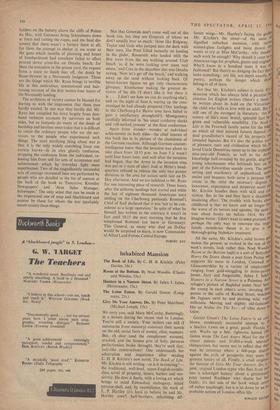Getting Off the Beach
The Longest Day. By Cornelius Ryan. (Gol- lancz, 21s.)
AFTER the great weight of put-downable books by Generals on how they won the war, here is an un-put-downable one about some of the men who helped them do it. One had almost forgotten there were such people. Not for them the pieces of cake.- the hitting for six, the royalties after- wards and the television lecture, making it all such a jolly good show. For them the airborne death by drowning as the aircraft carrying them overshot the Cherbourg peninsula and dropped. them like stones into the dark waters of the Channel; for them the frontal assault by rope
ladders on the battery above the cliffs of Pointe du Hoc, with Germans firing Schmeissers down at them and cutting the ropes, and the final dis- covery that there wasn't a battery there at all; for them the attempt to shelter in sea water as the guns which months of planning and hours of bombardment had somehow failed to affect poured down cross-fire on Omaha beach; for them the execution in the prison yard, the request from a mate to finish him off, the death by flame-thrower in a Normandy hedgerow. These are the things which Mr. Ryan brings to terrible life in this meticulous, unemotional and hair- raising account of the first twenty-four hours of the Normandy landing.
The architects of victory cannot be blamed for leaving us with the impression that these men hardly existed. In one way they hardly did. Mr. Ryan has compiled his story largely from first- hand verbatim accounts by survivors on both sides, but so fantastic do many of the deeds of hardship and heroism seem today that it is difficult to relate the ordinary people who are the sur- vivors to the people who experienced such things. The most terrifying thing about war is that it is the only widely ennobling force our society knows—in its own ghastly confusion, stripping the confusion from the individual, re- leasing him from self for acts of acceptance and achievement which by everyday light seem superhuman. Two of the magnificently successful acts of courage recounted here are performed by people who are detailed in the list of sources at the back of the book as 'Executive, Kemsley Newspapers' and 'Area Sales Manager, Schweppes.' The only sense that can be made is the impersonal one of map and blackboard and pointer by those for whom the war inevitably meant mainly these things. Not that Generals don't come well out of this book too, but they are Generals of whom we don't usually hear so much: those like Ridgway, Taylor and Gale who jumped into the dark with their men, like Pratt killed instantly on landing in his glider, Roosevelt who landed with the first wave from the sea walking around Utah beach 'as if he were looking over some real estate,' and Cota in the shambles that was Omaha saying, 'Now let's get off the beach,' and walking away up the sand without looking back. Of better-known figures we get only characteristic glimpses: Eisenhower making the greatest de- vision of his life ('1 don't like it but there it is . . . I don't see how we can do anything else'), and on the night of June 6, tearing up the com- muniqué he had already prepared ('Our landings in the Cherbourg-Le Havre area have failed to gain a satisfactory stronghold); Montgomery carefully informal in 'his usual corduroy slacks and roll-necked sweater' at the final conference.
Apart from wonder—wonder at individual achievement on both sides—the chief interest of this book lies in its picture of the clumsiness of the German reaction. Although German counter- intelligence knew that the invasion was about to take place from 10.15 p.m. on June 5 it wasn't until four hours later, and well after the invasion had begun, that the Army in the invasion area was put in a state of alert. Jodl at Hitler's head- quarters refused to release the only two panzer divisions in the area for action until late on D- Day afternoon. And we are indebted to Mr. Ryan for one interesting piece of research. Three hours after the airborne landings had started and while the last of eighteen thousand Americans were settling on the Cherbourg peninsula Rommel's Chief of Staff declared that it was 'not to be con- sidered as a large operation.' In spite of what he himself has written to the contrary it wasn't in fact until 10.15 the next morning that he first telephoned Rommel (on leave in Germany). This General, as many who died on D-Day would be surprised to learn, is now Commander of Allied Land Forces, Central Europe.
ROBERT KEE



































 Previous page
Previous page